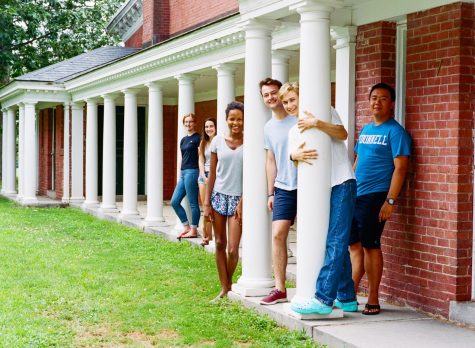Groton Theater Goes Back to the Classics
This upcoming Fall, theater director Laurie Sales will bring the classical Greek play, Antigone, to Groton.
Its unique rehearsal process and set design will only complement the play as Antigone deal in complex themes like human suffering and the clash of ideas; the play has “much to say, much to try to understand, and no real answer to what it means,” according to classics teacher David Ross.
Choosing a season of shows is more involved than it seems, because Laurie has to think about not only the needs of the theater students, but also the school at large. “I consider that what we present on stage is seen by the greater Groton community and it is very important to me that we both entertain and educate with each piece of theatre we present,” she said.
After presenting the Odyssey in 2011, Laurie has been wanting to take on another Greek play, as Groton is “an ideal place to tackle classics on stage.” She chose Antigone this time because “it is about young people using their voices to change the world. It centers on a female character who is unafraid of her fate and able to stand head to head with a male demagogue. It’s brutal, but not without humor, irony and loads of contemporary resonance.”
The cast will play a part in forming the script: reading various translations of the play and making choices about how to undertake the text in an entirely original way.
Claire Holding ’21, who will be joining the cast, looks forward to “figuring out how [the cast] will be interpreting the play and adapting it to [their] needs and desires.” She hopes to gain a better understanding of traditional Greek plays and learn about their cultural differences from our contemporary times.
Caroline Drapeau ’21, who will also be a part of the company, is excited about discussing themes pertaining the play in the context of the classical era. She believes that she and the rest of the cast will gain a lot from such discussions and that learning about a classical play like Antigone will be a “valuable experience in itself.”
Unlike other Groton productions, Antigone will not be having auditions or casting ahead of time. The show will be developed by the group of students who elect to be a part of theatre this fall, and Laurie will decide on casting the roles two weeks into the development and rehearsal process.
“This allows us to make choices based on the shape of the show and its evolution. We may play with expectations, have multiple actors play single roles, or create a new definition of a chorus for this production,” she said. How the play turns out will be largely determined by what the cast wants.
Antigone is Laurie’s first production after her sabbatical. Both Claire and Caroline have worked with her in previous productions and they are especially thrilled to have her back. Caroline describes Laurie as “incredibly creative” and asserts that Laurie will “lead the cast boldly into the depths of the play and the characters, as well as facilitating dialogues about the show and its place in our own society.”
Moreover, Laurie will be incorporating inspirations from her travels during the past year into the set design. However, she did elaborate, saying she wants it to remain a surprise since it is “not what most will expect.”
According to Dr. Ross, Antigone is a play “about powerlessness, that has a certain sort of right on its side, when confronted with power, which also has a sort of right on its side.” Nobody wins in the play, because winning and losing, or being right or wrong, is not what is important. What matters is the contest between the two opposing ways of thinking.




